

Téléchargements mobiles - Diamond Monét Frison. Everything is wrong with Vanessa Grigoriadis’s interview and profile of Nicki Minaj. What We Can All Learn From Nicki Minaj Schooling Miley Cyrus on Tone Policing. While it’s true that Nicki Minaj has her own beef with Miley Cyrus, and also true that Nicki doesn’t actually know I exist, I can’t help but believe that when Nicki Minaj called Miley Cyrus out at the 2015 Video Music Awards, she did it just for me.
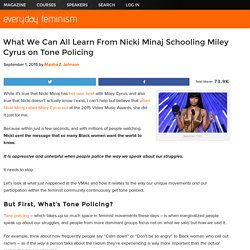
Because within just a few seconds, and with millions of people watching, Nicki sent the message that so many Black women want the world to know. It is oppressive and unhelpful when people police the way we speak about our struggles. It needs to stop. Salons Sneaking Relaxers in on Naturals? 4.25/5 ( 85% )based on 4 ratings So, as always I was on Twitter (Follow Me) and I saw a “Tweet” by Strawberricurls about a natural going to the salon to get a wash and style but, instead the beautician gave her a relaxer by mixing the relaxer in her conditioner.

Here’s some of the story: “I agreed as long as it didn’t take too long and she promised it wouldn’t. To the back of the salon she goes to mix up a deep condition treatment.. I didn’t find this abnormal. Black Girls Hunger for Heroes, Too: A Black Feminist Conversation on Fantasy Fiction for Teens. Photo: Katniss and Rue hang out in the first Hunger Games film.

What happens when two great black women fiction writers get together to talk about race in young adult literature? That's exactly what happens in the conversation below, where Zetta Elliott (below left), a black feminist writer of poetry, plays, essays, novels, and stories for children, and award-winning Haitian-American speculative fiction writer Ibi Aanu Zoboi (below right) decided to discuss current young adult sci-fi.
ZETTA ELLIOTT: Do you remember reading books as a child that served as a mirror for you? IBI ZOBOI: Not at all. This Is What I Mean When I Say "White Feminism" Well this is a post I've been meaning to write for a while.
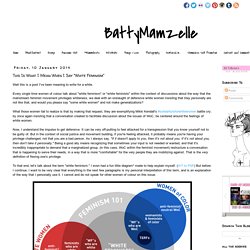
Every single time women of colour talk about "white feminism" or "white feminists" within the context of discussions about the way that the mainstream feminist movement privileges whiteness, we deal with an onslaught of defensive white women insisting that they personally are not like that, and would you please say "some white women" and not make generalizations? What those women fail to realize is that by making that request, they are exemplifying Mikki Kendall's #solidarityisforwhitewomen battle cry; by once again insisting that a conversation created to facilitate discussion about the issues of WoC, be centered around the feelings of white women.
Now, I understand the impulse to get defensive. It can be very off-putting to feel attacked for a transgression that you know yourself not to be guilty of. To that end, let's talk about the term "white feminism. " Gradient Lair. Misogyny is the hatred of women.
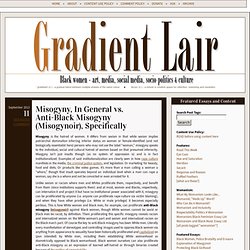
It differs from sexism in that while sexism implies patriarchal domination inferring inferior status on women or female-identified (and not biologically essentialist here) persons who may not use the label “woman,” misogyny speaks to the individual, social and cultural hatred of women based on that presumed inferiority. Misogyny isn’t just insults though (as no system of oppression is) and is in fact institutionalized.
Examples of said institutionalization are clearly seen in how rape culture manifests in the media, the criminal justice system, and legislation. Or marketing for beauty, food and diets. Or products like video games. Misogyny dehumanizes women in, general. Black Feminist Killjoy. What Happened When A Biracial Woman Was Photoshopped In 18 Different Countries. What makes someone "beautiful"?
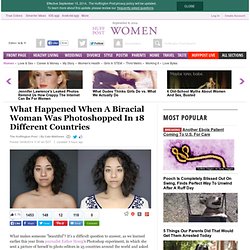
It's a difficult question to answer, as we learned earlier this year from journalist Esther Honig's Photoshop experiment, in which she sent a picture of herself to photo editors in 25 countries around the world and asked them to "Make me beautiful. " The variety of results she received -- some lightening her already pale skin, some darkening it, some adding makeup, some adjusting the skeletal structure of her face -- challenged the idea that there is an ultimate kind of beauty, a "perfect" woman.
But when journalist Priscilla Yuki Wilson replicated Honig's experiment, she found that her biracial identity caused things to play out differently. (Story continues below.) The photo Wilson sent out to Photoshoppers around the world. Half Japanese and half black, Wilson has fielded the question "What are you? " Nicki Minaj's Unapologetic Sexuality is Not a Crisis. In her own way, Nicki Minaj broke the Internet.
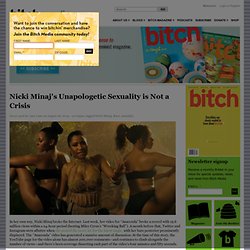
Last week, her video for “Anaconda” broke a record with 19.6 million views within a 24-hour period (besting Miley Cyrus’s “Wrecking Ball”). A month before that, Twitter and Instagram were aflutter when she posted the cover art for the latest single, with her bare posterior prominently displayed. The “Anaconda” video has generated a massive amount of discussion: At the time of this story, the YouTube page for the video alone has almost 200,000 comments—and continues to climb alongside the number of views—and there’s been coverage dissecting each part of the video’s four minutes and fifty seconds. Nicki Minaj’s Feminism Isn’t About Your Comfort Zone: On “Anaconda” and Respectability Politics.
The hype over Nicki Minaj‘s “Anaconda” has been a long process.

It started when the cover, which featured a controversial image of Minaj’s behind, leaked on the Internet to much dismay; it continued to play out after the track’s audio release as the lyrics were heralded as feminist gold, and it all came to a much-needed climax in the form of the music video featuring Minaj, some backup dancers, and Minaj’s ass. Oh, and Drake was there. Folks are now, as usual, scrambling to decide: empowering, or not empowering?
If anyone had actually been paying attention to Nicki all these years, they’d already know the answer. When Beyoncé‘s feminist credentials came under fire by feminists in the past year, there was hell to pay. Jeneil Williams 'Style Has Many Faces' (Vogue Japan) The Problem With BeyHive Bottom Bitch Feminism. In Pimp Theory, a “bottom bitch” is the one in the whores’ hierarchy who rides hardest for her man.
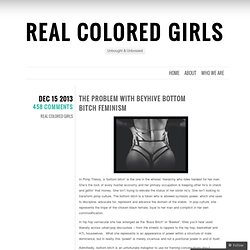
She’s the rock of every hustler economy and her primary occupation is keeping other ho’s in check and gettin’ that money. She isn’t trying to elevate the status of her sister ho’s. She isn’t looking to transform pimp culture. The bottom bitch is a token who is allowed symbolic power, which she uses to discipline, advocate for, represent and advance the domain of the stable. In pop culture, she represents the trope of the chosen black female, loyal to her man and complicit in her own commodification. In hip hop vernacular she has emerged as the “Boss Bitch” or “Bawse”, titles you’ll hear used liberally across urban/pop discourses – from the streets to rappers to the hip hop, basketball and ATL housewives.
Why must we accept the casual racism in pop videos? Parenting website Netmums published a survey last week that highlighted huge concern over young children viewing – and perhaps imitating – moves in music videos.
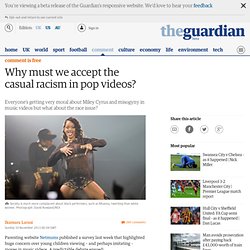
A predictable debate ensued: paternalistic/moralistic comment on one side and, on the other, those who'd have us calm down and just turn it off. But music videos are not simply throwing more flesh at us, but loads of layered messages. Chief among these are narratives around race, which go largely unremarked on by the mainstream media. A Black Woman Who Loves "White Folks" Music. Tweet from February 15, 2012 to be logged in The Library of Congress for future generations: Fun Random Fact for the Day: Pandora Radio figured out I liked Tool before I did.
Such an admission used to bring about confused stares and side eyes along with that inevitable question: “You like white folks music?” White folks music. A black girl isn’t supposed to be into that. Yet I was, I am and I have been all my life. The black girl who likes “white folks music” is always the odd girl out. 12 Years a Slave's Reminder: Slaves Didn't Win Freedom by Being Manly - Noah Berlatsky. Unlike Glory or Django Unchained, Steve McQueen's film resists the notion that a slave could overcome the institution just by fully asserting his masculinity. Fox Searchlight Hollywood is in general uncomfortable with race, but it likes heroic masculinity. It's no surprise, then, that films about slavery often end up being about men becoming men. Django Unchained is a basic revenge story, with Django taking up the phallic gun to blast the evil forces that have held him down and captured his wife. Glory is a standard military parable, with the weak and undisciplined black troops learning to be a deadly fighting force even as their boyish white commanding officer proves himself.
Remarkably and honorably, 12 Years a Slave, based on Solomon Northup's 1841 autobiographical narrative, has a different story to tell. Northup is courted by two men who promise him a touring gig, and then, after they've lured him to Washington, slip him a drug, knocking him unconscious. Why White People Can’t Quit Blackface. Before I saw those pictures of her online Monday morning I didn’t know who Julianne Hough was.
Even after Googling her, I’m still not entirely sure. Ballroom dancer and country music singer? Which is it, Julianne, did you have a hit song or were you just on Dancing With the Stars? Afropunk - Issa Rae's "Orange is the New Black" parody. Interview with The Perverted Negress. By Sexual Correspondent Andrea Plaid A while ago, Latoya Peterson, and I offered a two-fer about the Ciara/Justin Timberlake video, “Love Sex Magic.” The image of Timberlake pulling Ciara’s dog leash brought up the idea of “race play” and racism. Sexologist Bianca Laureano suggested that I talk to Mollena, a expert on race play, about it. Afropunk - If you get called "militant" at every family event and...
Are Black Names ‘Weird,’ or Are You Just Racist? Black Women and Mental Health. 21 Racial Microaggressions You Hear On A Daily Basis. Afropunk - microaggressions. De-Tangling Racism: On White Women and Black Hair. Pictures from a new exhibit by photographer Endia Beal called “Can I Touch It?” Showcase several white women, all corporate execs, who agreed to get a “Black hairstyle” and then have their portrait taken. A Cornucopia of Black Girl Hair on White Women’s Bodies.